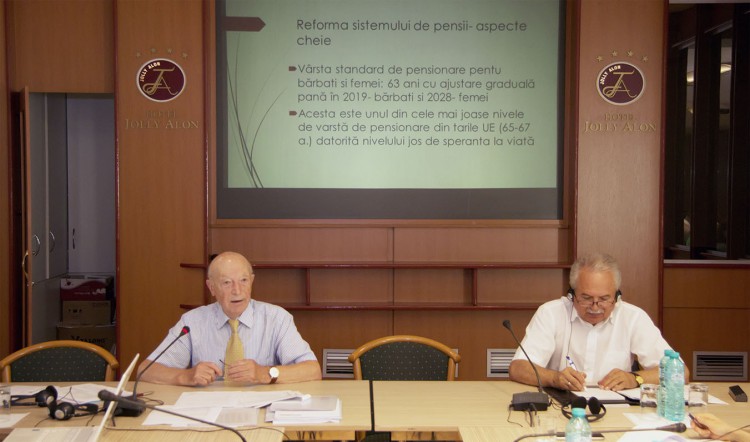The deficiencies in the new pension law were discussed in a workshop
Implementation of the reform of the pension system in the Republic of Moldova: achievements and challenges – this was the theme of a workshop, held yesterday in Chisinau on 12 July, organized by the Friedrich Ebert Stiftung Foundation (FES) in Moldova, in collaboration with the National Trade Union Confederation of Moldova (CNSM).
Within the framework of the activity, representatives of FES, trade unions and employers, together with an international expert in pension systems, made an analysis of the deficiencies and the evolution of the implementation of the new pension law in our country. At the event were also invited representatives of the Government, Parliament and the National Social Insurance House, but they did not attend the invitation.
According to Ana Mihailov, FES program coordinator, the workshop is a continuation of the Foundation’s collaboration with the CNSM in the process of reforming the pension system. “After the new law came into force, we set out to analyze its evolution, to identify the good and the weak points of the reform, to see what we need to do next to overcome them. Now we are at the stage of finalizing the analysis paper to be submitted to the authorities and all parties concerned. In addition, along with the CNSM, we are planning a broad information campaign on the subject,” she said.
Sergiu Sainciuc, vice-president of CNSM, mentioned that trade unions were plenary involved in reforming the pension system, elaborating their own vision on the reform concept. “If until the adoption of the law we had separate positions, now we want to formulate a common vision of CNSM, FES and the foreign expert on reform deficiencies, including strong arguments on the actual real situation, why we propose certain amendments and completions of the legislation. Of course, it was more effective if the authors of the reform were involved. If we had listened to each other in the process of drafting it, today we probably did not encounter so many gaps in the law,” said the trade union leader.
Martin Hutsebaut, an international expert on pensions, supported CNSM in drafting proposals for reforming the pension system by carrying out a comprehensive analysis of the pension system in the Republic of Moldova, presenting various models and approaches in the field discussed in several European Union countries.
This time, the expert was asked to address the shortcomings of the new law, bringing his critical comments on some issues.
These relate to: non-contributory periods, indexation of pensions, right to early retirement, right to survivor’s pension and its payment, financial support to the basic pension, re-examination of pension rights of persons who continue to work, reduction of the standard retirement age only for women who have born and educated 5 and more children, the standard retirement age, the retirement age of those who work in very bad and very hard working conditions, the contribution period for very hard and dangerous work.
At the same time, the expert found that, even after the reform of the pension system in 2016, the level of old-age pensions in Moldova remains relatively low compared to the countries that developed the second pillar. Therefore, he reiterated the need to create the second pillar of pensions, which would bring quite rapid results.
Department of mass media and international relations



